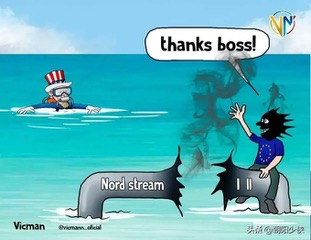In whose interests was the Nord Stream gas pipeline sabotaged?
In the last week of September there were a number of leaks in Nord Stream 1 and 2, culminating on 29 September in a major rupture.
The construction of the Nord Stream pipeline cost billions, to bring natural gas from Russia to Germany. It passes along the sea bed of the Baltic Sea; it also passes through Swedish and Danish waters, which both countries have declared “special economic zones,” therefore clearly their territorial waters.
The United States has been opposed to the Nord Stream project for a very long time, culminating on 7 February this year when the Biden regime declared: “There will no longer be a Nord Stream 2. We will bring an end to it.” When a journalist asked Biden to clarify this he said enigmatically: “I promise you, we will be able to do that.”
The United States has been unhappy with both German and French freelance work in easing tension between Ukraine and Russia. Both countries sponsored the Minsk 2 agreement between Ukraine and Russia in 2014.
But when the Ukrainian government returned to Kyiv they turned their back on it, under pressure from both the United States and Britain. Both countries had been engineering a war with Russia for some time; their planning and intervention in Ukraine culminated in the 2014 coup.
The German parliament, the Bundestag, voted against increasing arms supplies to Ukraine, 476 to 179. This was in response to mounting pressure from the German people, who are demanding an end to the war and the lifting of sanctions on Russia.
Germany, an exporter of high-end consumer goods to both China and Russia, has been hard hit by the illegally imposed US sanctions against both countries. The German people have also experienced an increase of 19 per cent in food prices.
Germany, the powerhouse of Europe, has been the major force in pushing a more independent political and military strategy for the EU, the Permanent Structured Cooperation (PESCO), to advance and protect EU interests both in Europe and globally. Following the suspected terrorist attack on the Nord Stream pipelines, one of Germany’s leading manufactures, the Wolfgang Grupp, called for a “break with America.”
As winter approaches, the demands of German workers would only have grown stronger, and there was the definite possibility of the German government being forced to break ranks with US war strategy. A break with the sanctions policy could have resulted in the reopening of Nord Stream 1 and 2 to get the gas flowing so that people could heat their homes. The sabotage of the pipelines now blocks off that option.
The visit of the German chancellor, Olaf Scholz, to the Gulf region (Saudi Arabia, UAE, and Qatar) last weekend [24–25 September] seeking more oil supplies failed to produce the result he had hoped for.
For Germany to get access to Russian gas it will now have to go begging to Ukraine and Poland to allow gas to be delivered by the old Yamal and Druzhba pipelines, built by the Soviet Union. This weakens any potential peace initiatives coming from Germany under pressure from the German people.
The sabotage of the gas pipeline was an anti-people attack, designed to prevent the people securing peace in Ukraine and Europe.
With the imposition of the illegal sanctions on Russia, particularly in relation to energy supplies, the United States has forced European states to buy American fracked gas—and to pay eight to ten times the contracted price with the Russian firm Gazprom.
So the US proxy war in Ukraine has served a number of strategic goals. Firstly, it has trapped Russia in a war from which it appears there is no way out: it has to be a military victory for one side or the other.
Secondly, it has forced significant neutral European states (formerly neutral at least) to throw in their lot and join NATO.
Thirdly, it was a call to heel for any further independent solo runs by Germany or France in their dealings with Russia and, no doubt, China.
Fourthly, the sanctions on Russia and the forced dependence on American gas are doing real damage to the economy of EU member-states, thereby weakening a major competitor to American transnational capital. The United States has now strengthened its political, economic and military control over the European Union—though not all elements within the ruling classes of the EU will be happy with this strategic turn of events, which can only lead to growing tensions within and between EU member-states and between the EU and the United States.
The next big test: Can the United States find unchallenged strategic dominance with its economic and military encirclement of China?
The world has been pushed into an extremely dangerous place by the actions and strategies particularly of US imperialism.
So it is clear whose interests were served by having the Nord Stream pipeline permanently out of action: the United States.
Peace, both in Europe and globally, will not be given to us but must be struggled for. The starting-point in Ireland is to end engagement with NATO by the Six Counties administration by demanding that each and every support and facility that NATO receives or uses be closed down.
We must demand a constitutional amendment to put neutrality in the Constitution of Ireland.
We must end all “constructive military co-operation” with the EU, in particular our participation in PESCO.
And Shannon Airport must be closed to all military flights.
Only such policies can help to bring about peace.






